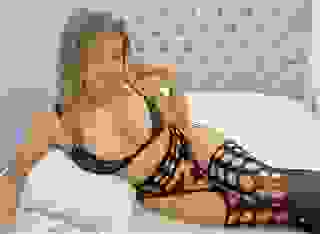- Romance
- Sharing Blankets
- Page 2
Note: You can change font size, font face, and turn on dark mode by clicking the "A" icon tab in the Story Info Box.
You can temporarily switch back to a Classic Literotica® experience during our ongoing public Beta testing. Please consider leaving feedback on issues you experience or suggest improvements.
Click here"Ma'am, I want to apologize for sleeping behind your store. I was riding in an empty cattle car on the train to Abilene when the brakeman found me and made me leave the train. It was late at night and I didn't have money for a hotel room. It had started to rain a little, and that roof in back of your store kept me dry.
"I must have scared the living daylights out of you, but I didn't mean any harm to anybody. I just wanted a dry place to sleep. I just wanted to tell you that I'm sorry. I'll be on my way now."
Elizabeth hadn't really looked at the man before Marshal Davies took him to jail, but now she did. Her first impression was that he looked like a whipped dog. His shoulders were rolled forward and that made him looked stooped over. Her second observation was that he hadn't had a good meal in a while. In spite of the covering of a full and unkempt beard, his face was drawn and he looked thin as a rail. Because of both, she couldn't really tell how old he might be, but she thought he was probably about her age.
His clothes didn't help that look either. She guessed that his trousers had once been Confederate Army uniform trousers, but they were so worn and dirty it was hard to tell for sure. His shirt was made of the linsey-woolsey material that was commonly used for men's shirts, but it too was frayed around the cuffs and stained with sweat. He also wore two long coats draped over his shoulders. One was the gray of the Confederate Army, but the other was the blue coat of the Union Army, or at least had been at one time. The blue had faded to a dirty gray and the bottom edge was ragged. The stitching on his right boot had come loose at the toe and the left wasn't in much better shape.
Elizabeth warned herself not to take pity on this man. She didn't know who or what he was or had been. Regular attacks by the bushwackers from Missouri had stopped, but Elizabeth knew there were still small groups operating. She had read in the newspaper that those groups had robbed banks in Missouri, Arkansas, and Kansas. He might be one of those men. He'd also been drunk and she'd never approved of drinking. When she began operating the store by herself, she refused to sell whiskey.
She didn't have that thought for long, though. The man didn't have a gun and he didn't look dangerous. He looked like he'd given up on life. He also looked like he would probably die if she didn't help him, and she'd experienced enough death to last her a lifetime and then some. She couldn't wish that on anyone, even a stranger.
"What's your name, sir?"
"Matthew Martingale, Ma'am."
"Well, Matthew Martingale, how long since you had a good meal? Looks to me like quite a while. I'll fix you one if you'll help me the rest of the afternoon. Then you can be on your way."
Elizabeth showed Matthew what she needed done, and then stood back and watched him work. He was stronger than he looked, and he worked hard. What would have taken her until suppertime to finish, he did in an hour. He then asked her if she needed anything else done.
After the sacking of Lawrence in 1856, her father had always kept a large number of rifles, shotguns, pistols, and ammunition for them in his general store. That was because many of the people in town had given up their firearms to the bushwhackers in hopes of avoiding anything worse. Her father had initially sold guns at his cost so the people could again hunt and defend themselves. Over time, Mason's General Store became the place people from as far as twenty-five miles away came to buy their guns and ammunition.
When Elizabeth began operating Mason's General Store by herself, she continued the practice of stocking the store with guns and ammunition of all types including the newest rifles and revolvers that used the new metallic cartridges. She had just received a shipment of Remington New Model Army revolvers that had been converted from percussion to use.46 rimfire cartridges. Marshall Davies had told her about the Remington conversions and asked her to order two for him.
Some of the men going to the mines had already purchased Henry rifles from her. With the metallic cartridges, these rifles could be kept loaded without fear of the powder becoming too damp to fire or the loss of percussion caps. Elizabeth reasoned other miners might also find this an advantage in a revolver, so she'd ordered ten of the revolvers along with a thousand cartridges in boxes of fifty cartridges each. She hadn't opened the crate because she'd been too busy with running the store.
Elizabeth pointed to the crate and told Matthew he could open it and put the revolvers in the counter display.
As she watched Matthew, Elizabeth was at first surprised, then concerned. When Matthew took the first revolver from the crate, he thumbed back the hammer to half-cock and then rotated the cylinder through all six chambers. Then he fully cocked the hammer and checked the cylinder to make sure it was securely locked into position. After that, he held the hammer with his thumb and slowly pulled the trigger until the hammer fell.
Matthew repeated this for each chamber of the revolver, then pulled out the cylinder pin and cylinder, and held the revolver up and looked down the barrel. It was then that he saw Elizabeth watching him. He put the cylinder back into the revolver frame, pushed the cylinder pin back in, and then put the revolver back into the crate before looking at Elizabeth.
"Ma'am, I'm sorry. I heard about these, but I've never seen one before."
Elizabeth frowned.
"You might not have seen one before, but you seem to know a lot about them. What you just did is what my father would have done. Where did you learn to do that?"
Matthew shrugged.
"A lot of men know about revolvers. There was a war, you know."
Elizabeth raised her voice a little.
"Yes, I do know. That how my father got killed. Bushwhackers from Missouri came to town and killed almost every man and boy here and stole most everything from this store. Which side were you on?"
Matthew stood up.
"Does it matter? It's over now. The South lost and the Union won."
Elizabeth was becoming upset because he wouldn't give her a straight answer.
"It matters to me. How do I know you weren't one of the men who killed my father. You look a lot like they looked."
Matthew had a hurt look on his face when he answered.
"I wasn't one of your bushwhackers. They were animals, and Ma'am, I'm not much but I'm not an animal. I thank you for the offer of supper, but I think I should be leaving now."
That look and the defeat in his voice softened Elizabeth's mood.
"I didn't say you were. I just said you could be. Now I think you're telling me the truth, well, some of the truth anyway. Go ahead and put the revolvers and cartridges in the case. I'll go upstairs and start supper."
With that, she stood up and went up the stairs at the back of the store.
Matthew cursed himself for what he'd said to the only woman who had befriended him since the war ended. Elizabeth was the first woman, really the first person, who hadn't treated him as a person to be avoided.
He knew it was his drinking more than which side he'd been on. Most people he'd met since the end of the war, both people who hadn't fought and the soldiers of both sides, were ready to forget and get on with their lives. He couldn't blame the people who turned away when he got close. He smelled of whiskey and was always either drinking, drunk, or recovering from being drunk. There was a reason for that, at least in his mind there was.
When the war ended, Matthew didn't want to go home. He couldn't face his father because of what he'd done. Instead, Matthew decided to do what some of his fellow soldiers had said they were going to do. Silver had been discovered in Colorado, and there, a man could make his fortune by digging the silver ore out of the earth. He probably would never see his family again, but that would be better than seeing the look on his father's face.
Matthew set out on a course that would lead him though Kentucky, Illinois, Missouri, and Kansas before he reached Colorado. He was well prepared to do that. After each battle, the dead had to be buried and because the numbers of the dead were so many, most soldiers who weren't wounded were assigned to a burial detail.
For the first few months, Matthew had taken this responsibility seriously and had said a prayer over each grave, but after he'd dug what seemed like a thousand graves, he'd stopped seeing the dead as people who had once lived and breathed. They became just a weight wrapped in a blanket that had to be put into the ground before the stench became unbearable and attracted scavenging animals.
Also for that first few months, he had witnessed soldiers of the burial detail searching the pockets of the dead and stripping them of clothing. He equated this with theft and refused to participate. As the war wore on though, he needed new boots because the boots he'd been issued had begun to rot away from slogging through swampy ground and wading across streams and rivers.
It was easy to justify taking the boots off the dead man he was in the process of burying. The dead man wouldn't know or care, and Matthew had tired of his feet being wet all the time. When his trousers and shirt wore out, he took them from the dead as well. Many were new recruits so their uniforms were nearly new. By the ending days of the war, it didn't matter to him or any other men if the trousers and shirts were gray, blue, or homespun. If they didn't have more than a few holes, they took them and wore them.
From that first step, it had been easy to do what many other men in the burial details did. Few dead men had many coins except for senior enlisted men and officers, but a few bits here and a few bits there soon added up. Often, he'd bury a man he knew had scavenged the pockets of other dead soldiers and would find as much as five dollars in gold. By the time the war ended, Matthew carried a leather pouch inside his trousers and tied to his belt that held almost sixty dollars in gold coins.
There were always wounded men after a battle and those men had to be taken to the field hospitals that were set up behind the actual battlefield. After the Battle of Kelly's Ford in March, Matthew had helped carry the wounded from wagons into the field hospital. When he'd finished, his coat was soaked with blood. To keep himself warm while he washed his own coat, he'd taken the coat off a dead soldier before he buried him.
He'd washed his own coat as soon as he could, but kept the other coat too. Doing battle in winter meant you didn't notice the cold. Sitting in an encampment or manning a trench in winter with nothing else to do would make any man feel like he was freezing to death. During the previous winter, he'd have welcomed having two coats to wear.
When the war ended, men from both sides began going home. Most were walking and spent their nights under the stars around a fire. Matthew had tried to stay away from other people so he could avoid questions about the war, but one night another man walked into his little camp and asked if he could stay. Matthew said he could but he didn't have any food for the man. The man just smiled and said he could find food the next day. He then took a bottle of whiskey from the haversack on his side, pulled the cork, and took a drink.
He then offered Matthew a drink, and when Matthew said he didn't drink whiskey, the man just shrugged and said, "You must not have seen as much in the war as I did. I didn't drink whiskey either until I couldn't sleep at night. This here puts me to sleep and I stay that way until morning."
Matthew hadn't taken a drink that night, but the next time he went through a town, he stopped at the general store and bought a bottle of whiskey. That night, he pulled the cork on the bottle, took a tentative gulp, and then coughed as the fiery liquid burned its way down his throat. When he stopped coughing, he took another, smaller swig.
The burning wasn't as intense so he took another and then another. When the bottle was a fourth gone, Matthew replaced the cork, lay down on his bedroll and fell asleep.
The next morning he woke up to the chirping of birds and realized what the man had said was true. For the first time in a long time, he'd slept through the night without waking up even once. His head hurt a little, but that was better than waking up in a sweat and terrified of something he'd dreamt but couldn't really remember.
For about a month, one bottle lasted him for four days. After that month, he had to buy a new bottle every three. By the time he reached Kansas City, he was drinking half a bottle every night and had spent the last of his money.
That was why he'd been riding in a cattle car. He had no money to buy passage across the river or to buy a train ticket. He'd found a train going west and hidden in an empty cattle car one night. The train had stopped in Lawrence for water and the brakeman making a check of the cars had found him and forced him off the train at gunpoint. Matthew had started walking through the alley of the main street in Lawrence when a few raindrops started falling. He was behind the general store and saw the roof over the loading platform.
After finishing the last of his bottle of whiskey, Matthew had tossed the empty bottle to the side and then climbed up on the crate on the loading platform and fallen asleep. He'd slept until someone shook him awake.
Matthew wasn't sure why he went back to apologize to the woman, but it was something he thought he should do. He'd seen the look on her face when the Marshal took him to jail. It was a look more of pity than anything. Matthew didn't want pity. He'd done what he'd done of his own free will. The consequences were also of his own doing.
He had intended to just apologize and then start walking to Colorado. It would take him a while unless he could hide on another train, but he'd eventually get to the silver mines. Food would be a problem, but he'd foraged for food during the war and he could do it again. His only real problem was that he'd finished his bottle of whiskey. If he couldn't find more, he'd have to contend with a lot of nights of horrible dreams.
When the woman had said she'd feed him if he'd help her, he'd been so surprised that he couldn't tell her no. Once he'd started doing what she asked, he was happy he hadn't. It felt good to be doing something other than just walking and staying away from people. It wasn't until after he had opened the crate of revolvers that he had second thoughts.
As soon as he took the first revolver from the crate, Matthew automatically went through the routine he'd used in the war before loading the revolvers that were always in a holster on each hip. It was something he'd done so often he didn't even think about what he was doing. He was starting to inspect the cylinder when he saw that the woman was watching him.
She had looked afraid and her voice sounded angry when she'd asked what he did in the war. That was a question he wasn't about to answer, not to anyone, much less to a woman he'd just met. When he'd tried to avoid answering, she'd basically accused him of being one of the people who had murdered her father.
That accusation had hurt because it brought back memories of the internal struggles he'd had early in the war. The Bible said, "Thou shalt not kill". Was it killing when he killed a man who was trying to kill him? The Bible also said, "An eye for an eye and a tooth for a tooth." Didn't that mean it was acceptable to kill the men who had killed other men in his company?
He'd gone six months trying to decide which was right, killing the man who was trying to kill you, or being killed because it was a sin to kill another man. He hadn't fired a rifle or a pistol during that six months.
It wasn't until Antietem that he'd decided, and he reached that decision only because he was faced with either killing other men or being killed as part of the wholesale slaughter that took place that day. Matthew had reasoned that since God was on their side, God's plan was for their side to carry the day by whatever means necessary. It would be like the battles described in the Bible. He'd never read that the people who fought on God's side were denied entrance into Heaven when they died. Instead, the Bible said they were helped to victory by God.
What the woman had accused him of wasn't and could never be true. He had heard of the unofficial war in Kansas and Missouri between the bushwhackers and the jayhawkers, except it wasn't a war. It was just outlaws on both sides using the war as an excuse to pillage the countryside for their own benefit and bloodlust. Matthew knew he could never kill another man just for the sake of killing him, and he could never kill a woman or a child.
That she seemed to change her mind when he denied it hadn't helped his state of mind. He couldn't understand why she would be afraid and angry one second and then again offer to fix him a dinner. She wasn't like anyone he'd met since the war ended.
Dinner was both more than Matthew had expected and a little uncomfortable. He didn't know if she was just a good cook or if it was because he'd not had such a meal since before the war started. The thick slice of ham and the mound of fried potatoes on his plate looked and tasted like what his mother had fixed. It was hard to maintain the table manners he'd been taught as a child. His belly kept telling him to eat as fast as he could.
The woman also wanted to talk, and that was the uncomfortable part. She started by telling him her name and then telling him why she was running the store.
"Matthew, I just realized I didn't tell you who I am. My name is Elizabeth Orley. You're probably wondering why a woman was working in the store on Sunday. It's because it's my store. It was my father's before he was...after he was gone, I thought about going back to Indianapolis, but I'd been gone so long I wouldn't have known anybody there. At least in Lawrence I knew the people so I decided I'd keep running the store. I'm all by myself, so sometimes I have to work on Sunday afternoon to keep up. My father would have never approved. He always said since God rested on Sunday, we should to."
Matthew tried to make conversation.
"You're from Indianapolis?"
Elizabeth nodded.
"Yes, until I was fourteen. My father moved us to Lawrence to keep rich slave owners from buying up everything and turning Kansas Territory into another slave state. What about you? Where are you from?"
Matthew hesitated. If her father had been a free-stater, she probably was too. Virginia had been a slave state. What would she think if the told the truth? He decided to lie.
"I'm from Kentucky."
Elizabeth frowned a little.
"You don't sound like you're from Kentucky. I had a man who said he was from Kentucky come into my store a few weeks ago. You don't sound like he did."
Matthew tried to smile.
"Well, Kentucky has a lot of different sounding people. I'm from the east side, pretty close to Virginia...up in the mountains. The people who live there all sound like me as far as I can tell."
Matthew tried to change he subject away from himself.
"I've never been to Indianapolis. What's it like there?"
Elizabeth shrugged.
"About like it is here except there were more people. I expect there are a lot more now. It gets colder here in winter than I remember from Indianapolis, but I don't think it's as hot in summer. Why were you going to Abilene?"
Matthew was happy she wasn't asking him about the past. The past was something he wanted to forget forever.
"Where I'm going is Colorado, to mine silver. They say you can make a lot of money mining silver. Abilene was just where I figured the train would stop and I'd have to get off. I'd have found another train there, either that or started walking."








